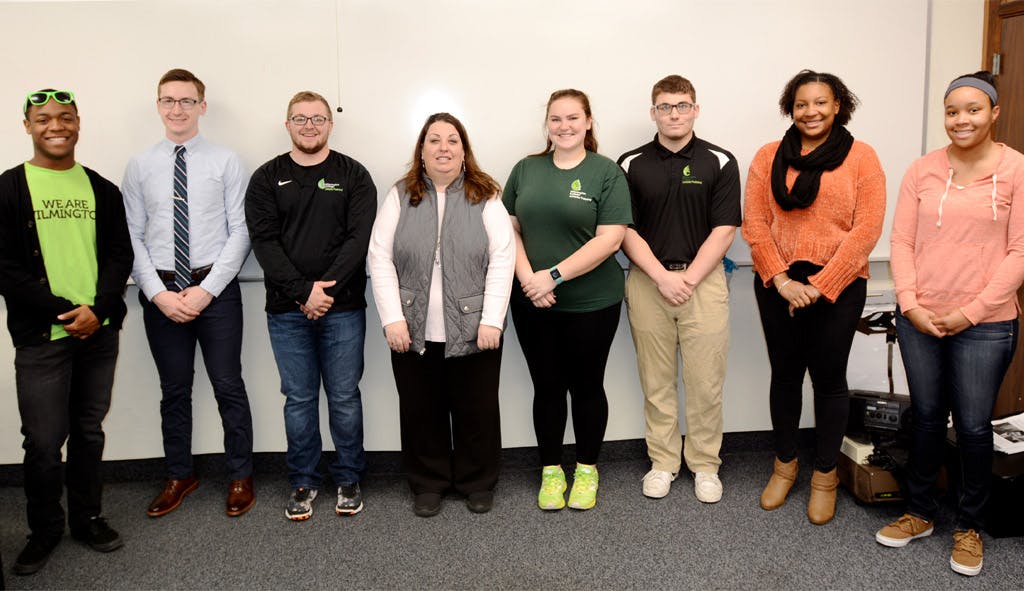Prof Is Long-Time Champion for Student Research Experience
All seven athletic training seniors in Dr. Erika Goodwin’s fall and spring semester research classes had their original research projects accepted for presentation and publication.
PICTURED: From the left are: Brandin Williams-Johnson, Samuel Tedtman, Chad Rairdon, Dr. Erika Goodwin, Megan Wieloch, Kyle Arcaro, Kennedy Harshaw and Mallon Pittman.
Kyle Arcaro, Kennedy Harshaw, Mallon C. Pittman, Chad Rairdon, Samuel Tedtman, Megan Wieloch and Brandin Williams-Johnson will all present their research at the Ohio Athletic Trainers’ Association (OATA) Annual Meeting and Symposium May 11 and will have their research abstracts published in the Journal of Sports Medicine and Health Science.
This marks the 15th year Goodwin, vice president for academic affairs and professor of athletic training, will take students to do research presentations at the OATA conference – totaling 96 poster presentations.
Goodwin, a champion for the student research experience, said Wilmington College holds a prominent place at the annual OATA conference and regularly has the most student poster presentations selected for the symposium.
“This really puts the College’s ‘hands-on learning’ into practice,” she added. “It’s one thing to take a class on research and statistics in athletic training and to do a project for the class, but it’s a whole different experience when you actually disseminate it and share your findings in the literature and at a conference with interested colleagues.
“That really instills a lasting impression in our students.”
Specific titles of original research include: Athletic Training Student’s Perceptions and Experience of Work Place Bullying by Kyle Arcaro (with faculty members Brett Massie and Erika Goodwin); Coaching Style and the Effect Coaching Style Has on an Athlete’s Willingness to Self-Report Injuries by Kennedy Harshaw (Brett Massie and Erika Goodwin); Prevalence, Knowledge and Influence of Whey Protein and Other Supplements on Athletes by Mallon C. Pittman (Brett Massie and Erika Goodwin).
Also, Athletic Trainers’ Knowledge and Treatment of Athletes with Paroxysmal Dystonia/Dyskinsia by Chad Rairdon (Brian Dykhuizen, Erika Goodwin and Paul Sparling, WC alumnus and head athletic trainer with the Cincinnati Bengals); Investigating the Efficacy of Emotional Freedom Technique on Perceived Stress in Athletic Training Students by Samuel Tedtman (Brett Massie and Erika Goodwin); Why Is Student Teaching Better Understood Than Clinical Experience for Athletic Training Students? by Megan Wieloch; and The Perception of the Athletic Training Profession in the High School Setting by Brandin Williams-Johnson (Jennifer Walker and Erika Goodwin).
In addition, Rairdon will present a case study titled NFL Wide Receiver with Paroxysmal Dystonia/Dyskinsia. Arcaro was invited to give a platform presentation on his research in the category of Student Original Research due to it being a top-scoring abstract.
Goodwin said research is what separates athletic training from being simply considered as a trade rather than a profession.
“Doing research projects and disseminating their findings helps students close the loop on their entire academic experience in college,” she said. “Presenting helps students build those critical soft skills that are often lacking in the young professional: critical thinking, polished oral and written communication skills, collaboration and professionalism,” she said.
“Also, it gives those going on to graduate school a big head start.”
Goodwin said the OATA selection committee utilizes a blind review process in which its consideration of top research submissions is made without possible bias, as students’ names and schools are not connected to the research projects.
“Our students know they earned it,” she said.
“By presenting at conferences like OATA, the students know and see the importance of scholarly endeavors,” Goodwin added. “They may not want to ever do a research project again — and that’s OK because it’s more important to me that they see the value and need of it and appreciate the work that others do to develop the knowledge base in their respective fields.”

Entire Class Has Research Projects Accepted for State Symposium
Athletic Training